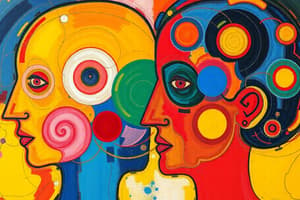Podcast
Questions and Answers
What is psychology?
What is psychology?
The scientific study of human behavior and experience.
Which philosopher is often considered the father of modern psychology?
Which philosopher is often considered the father of modern psychology?
- Sigmund Freud
- Wilhelm Wundt (correct)
- William James
- Aristotle
Aristotle focused more on philosophical inquiry than empirical observation.
Aristotle focused more on philosophical inquiry than empirical observation.
False (B)
What did Sigmund Freud introduce?
What did Sigmund Freud introduce?
Which two psychologists are associated with humanistic psychology?
Which two psychologists are associated with humanistic psychology?
The Greek word 'psyche' means __________.
The Greek word 'psyche' means __________.
What approach did behaviorism reject?
What approach did behaviorism reject?
The cognitive revolution focused solely on observable behavior.
The cognitive revolution focused solely on observable behavior.
Wilhelm Wundt established the first experimental psychology lab in __________.
Wilhelm Wundt established the first experimental psychology lab in __________.
What is one of the contributions of John Locke and David Hume?
What is one of the contributions of John Locke and David Hume?
Match the following early schools of thought in psychology with their primary focus:
Match the following early schools of thought in psychology with their primary focus:
Flashcards are hidden until you start studying
Study Notes
History of Psychology
- Psychology emerged from a combination of philosophical inquiry and scientific investigation into the mind and behavior.
Ancient Philosophical Roots
- Greek philosophers like Socrates, Plato, and Aristotle laid the groundwork for psychological thought.
- Plato highlighted the significance of the mind and the realm of ideas.
- Aristotle contributed through empirical observation and categorized human experiences, influencing early theories of behavior.
Renaissance and Enlightenment
- The Renaissance revived interest in human nature; René Descartes proposed dualism, separating mind from body.
- Enlightenment figures like John Locke and David Hume advanced empiricism, suggesting knowledge derives from sensory experience, paving the way for scientific study of the mind.
19th Century Foundations
- Wilhelm Wundt is recognized as the father of modern psychology, creating the first experimental lab in 1879, initiating psychology as a scientific discipline.
- Wundt utilized introspection to explore conscious experience.
- William James published "The Principles of Psychology" in 1890, advocating functionalism which examines the mind and behavior's adaptive functions.
Early Schools of Thought
- Structuralism, led by Wundt and Edward Titchener, focused on breaking down conscious experience into basic elements via introspection.
- Functionalism, influenced by James and Darwin, centered on how mental processes facilitate adaptation to the environment.
Psychoanalysis
- Sigmund Freud introduced psychoanalysis, emphasizing the unconscious mind, early experiences, and inner conflicts influencing behavior.
- His theories included the psyche structure and defense mechanisms, significantly impacting psychology and psychotherapy.
Behaviorism
- John B. Watson and B.F. Skinner established behaviorism in the early 20th century, dismissing introspection, focusing on observable behavior and environmental factors.
- Skinner's research on operant conditioning became a foundational aspect of behaviorism.
Humanistic Psychology
- Carl Rogers and Abraham Maslow popularized humanistic psychology in the mid-20th century, emphasizing personal growth and self-actualization, and highlighting human potential and experience.
Cognitive Revolution (1950s - 60s)
- The cognitive revolution shifted focus back to mental processes, such as thinking and memory.
- Key figures like Jean Piaget (cognitive development) and Noam Chomsky (language acquisition) were influential in the development of cognitive psychology.
Modern Psychology
- Contemporary psychology features diverse sub-disciplines, including clinical, cognitive, developmental, social psychology, and neuroscience.
- Integration of neuroscience has deepened the understanding of behavior's biological bases, linking psychological phenomena with brain function.
Define Psychology
- Derived from the Greek word "psyche," meaning soul, psychology studies human behavior and experience.
- The term reflects the scientific study approach, encompassing behavioral and mental processes across various dimensions including biological, cognitive, and cultural aspects.
The Practice of Psychology
- Psychological interventions include counseling, psychotherapy, psychosocial support, and trauma healing.
- Psychological assessment involves gathering information through various methods to evaluate mental health and behavior.
Studying That Suits You
Use AI to generate personalized quizzes and flashcards to suit your learning preferences.




